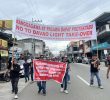DAVAO CITY – Reproductive health advocates expressed concern over the removal of the P1 billion budget for contraceptives from the 2016 national budget, saying this will greatly affect the poor women and their families who rely on government’s free contraceptives.
Mindanao representative, Luzviminda Ilagan of Gabriela Women’s Partylist in a phone interview said the cut will now affect those from the lower sector who are dependent on the government’s program.
“The budget was approved at the Lower House, but it was cut during the bicameral conference and the budget of DOH for contraceptives was removed,” said Ilagan.
Ilagan said the budget was really intended for poor women to have access to safe, affordable and accessible contraceptives.
“So ang madehado ana, ang malugi, ang mga babae kay diba ang gusto nato services? Unsaon pa na nila pag-akses kung wala nay budget para sa free contraceptives? (So the ones who will be really affected are the women. We want to provide services, right? But how can women have access to contraceptives if there is no more budget for free contraceptives?),” she said.
The bicameral conference committee last week decided to cut the Department of Health’s budget affecting the allocation for contraceptives.
Under the Responsible Parenthood and Reproductive Health Act of 2012 or Republic Act 10354, the government guarantees universal access to “medically-safe, non-abortifacient, effective, legal, affordable, and quality reproductive health care services, methods, devices, supplies which do not prevent the implantation of a fertilized ovum as determined by the Food and Drug Administration (FDA).”
It also provides for “relevant information and education thereon according to the priority needs of women, children and other underprivileged sectors, giving preferential access to those identified through the National Household Targeting System for Poverty Reduction (NHTS-PR) and other government measures of identifying marginalization, who shall be voluntary beneficiaries of reproductive health care, services and supplies for free.”
Under Section 10, the law mandates the DOH to “procure, distribute to LGUs and monitor the usage of family planning supplies for the whole country.”
Ilagan said the move will have implications on the maternal health in the country.
According to United Nations Development Programme, “the Philippines is in critical danger of not achieving the target on improving maternal health by 2015.”
Citing government data, the UNDP said: “While the maternal mortality rate (MMR) had been declining over the past two decades, from 209 per 100,000 live births in 1993 to 172 in 1998 to 162 in 2006, the rate of change has been relatively low. In addition, the decline appears to have stalled making the target reduction in MMR of 52 deaths per 100,000 live births by 2015 highly improbable.”
The UNDP said a large number of Filipino women “lack access to qualified reproductive health services.”
Ilagan added that unlike those from the middle and upper class who can opt to buy contraceptives whenever they want, the poor families need to choose between providing food for the family and buying contraceptives.
“Of course they will choose food, so that is where the government should come in to provide supplies for the mother,” said Ilagan.
Phelim Kine, deputy Asia director for Human Rights Watch, in a statement, said: “the Philippine government has taken a serious step backward in its obligation to protect maternal health, reduce infant mortality, and prevent the spread of HIV.”
Kine said the budget cut “threatens to roll back hard-fought gains in maternal health and reductions in infant mortality over the past decade made possible by government-subsidized or free contraceptive services.”
Kine also described the move by the Congress as “a victory for elements in the Roman Catholic Church in the Philippines that have bitterly opposed the free contraceptive services. “
“That opposition has included false claims about the safety and reliability of contraceptive methods such as condoms,” he said.
Joseph Michael Caldamo, site implementation officer of the Global Fund Project of the city’s Reproductive Health and Wellness Center said although the move “will not” directly affect their program, it will still have an impact for the campaign on the prevention of human immunodeficiency virus (HIV).
“The program of the government implemented by the DOH regarding HIV-AIDS is separate from the program of RH bill for contraceptives. So the condoms provided by DOH under the HIV program will not be removed,” he said.
Caldamo said their program has target clients including men who have sex with men and male homosexuals, but that they do not cover the family planning program where most of the women and their families depend for free condoms.
He said women are at risk of HIV if their husbands have multiple partners.
He said from 1984 to 2015 there are already 70 women who have HIV in Davao City. From January to September 2015, Caldamo said there are 11 females who have HIV here in the city.
The Davao City Aids Council (DCAC) said there are already nine deaths out of the 1,295 cases of Human Immunodeficiency Virus (HIV) infections in Davao City since 1984 until July last year.
The Human Rights Watch called on President Benigno Aquino III to restore the funds immediately “or be held accountable for the suffering that their ill-conceived actions incur.”
Ilagan said the move can be countered by passing a supplemental budget, but she added that it will now depend on the next government officials who will win the May elections. (davaotoday.com)








